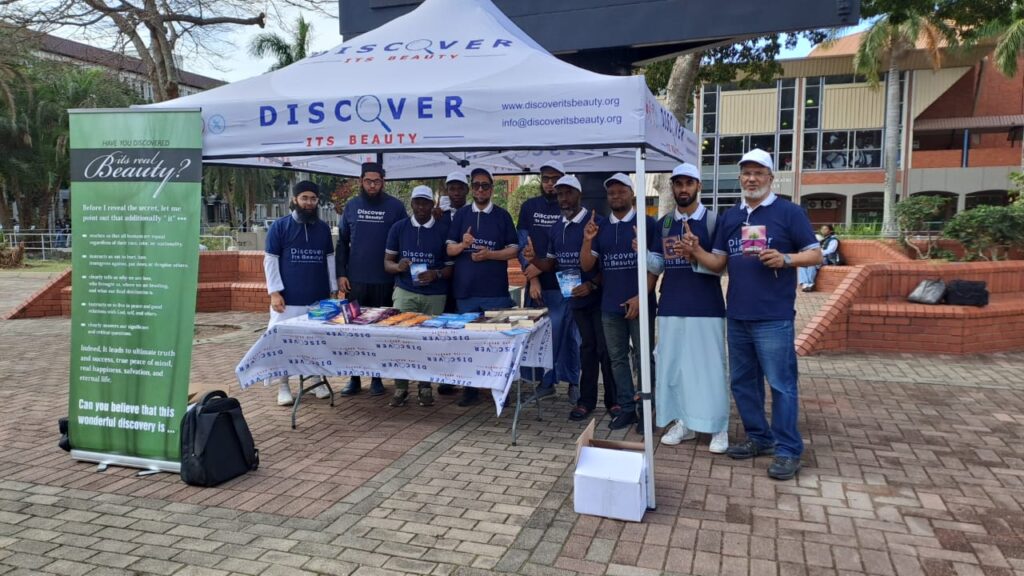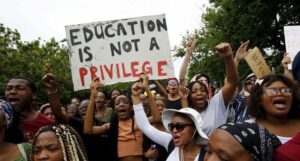
By Azra Hoosen
The Dawah table at the University of KwaZulu-Natal’s (UKZN) Westville campus – initiated by the Muslim Students Association (MSA) with guidance from the Islamic Propagation Centre International (IPCI) – has become more than just a point of contact for curious students. It has evolved into a space of genuine dialogue, reflection and growth drawing in not only students but also staff and passersby.
When the initiative was first set up, the MSA’s goal was clear: to correct misconceptions and provide a welcoming space for students to learn about Islam. Months later, the results show both the challenges and opportunities that come with Dawah on a diverse South African campus.
MSA Public Relations officer, Abdullah Khan, told Al-Qalam about the initiative’s transformation: “The Dawah table has played a huge part in informing the non-Muslim masses about Islam. It also has had a very strong impact on the Muslim students, who are now learning about the Deen to help in the Dawah efforts. We even have members of the cafeteria staff getting involved in spreading the teachings of Islam,” he said.
Muslim students who once stood by quietly now step forward confidently, engaging in conversations and answering difficult questions. For many, this has been their first experience of taking Islam beyond just personal practice and sharing it publicly.
Moulana Ismail Moosa from IPCI, who has been guiding the project, told Al-Qalam that the focus is on building long-term capacity. “Our plan this year is to develop a sustainable model that can be expanded nationally. It would include Dawah days, training sessions, classes and ultimately, a whole culture of Dawah on campus – a system that can be sustained,” he said.
The IPCI has already visited twelve campuses in Durban, Pretoria, and Johannesburg, with close to 20 outreach programmes conducted. The aim is to finalise this model so that by 2026 or 2027 it can be rolled out to universities across the country. “In Cape Town, Bloemfontein, Port Elizabeth, and the major universities in Johannesburg and Pretoria, IPCI is already assisting students in different ways. Insha’Allah, once this model is in place, it will spark great change across campuses,” explained Moulana Moosa.
As with any public initiative, there are voices of caution and concern about young Muslims taking such a visible role. Moulana Moosa encourages a balance. “There is merit in worrying and being hesitant. Of course, we want to protect our students. But the reality is that they are already out there in the world. They are already interacting on public platforms in many other aspects. If the responsibility of Deen is placed on their shoulders, Insha’Allah, this will assist them and make them take the Deen more seriously. We should be there to support them rather than hold them back,” he said.
For Moulana Moosa, one of the most inspiring aspects of the Dawah table has been witnessing the determination of students as they step into unfamiliar spaces. “For most of them, this is something completely foreign. Going up to a non-Muslim and starting a conversation is not something that comes naturally. Yet, despite that, they are still willing to try, or at the very least, to support the initiative,” he said.
He added that what sets these students apart is their conviction: “The majority of Muslim students we work with are ready to firmly preserve the Islamic identity. They are motivated by the desire for others to accept Islam as a reality.”
For the MSA, the Dawah table continues to be both a service to others and a means of strengthening their own faith. For IPCI, it is a model of how grassroots Dawah can thrive on campuses reaching the youth at the most pivotal stage of their lives. “This work is about planting seeds. Even if someone doesn’t embrace Islam, they walk away with respect, with clarity and with questions answered,” said Moulana Moosa.
He believes that is a victory in itself.
Khan prays that Allah accepts everyone’s efforts and continues to use Westville campus for the work of Deen. [Ameen]










